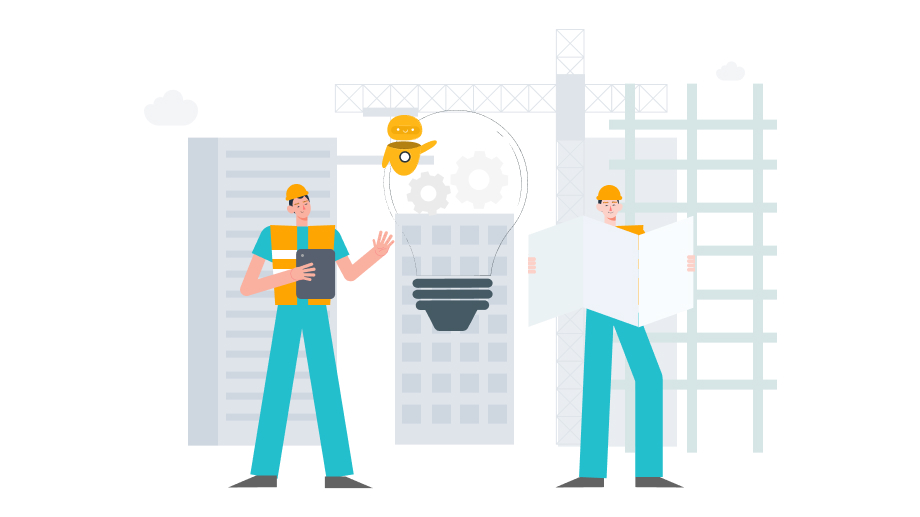The construction industry has witnessed a surge in the adoption of cutting-edge technologies, such as GPS time clock, predictive maintenance sustainable operations. However, Artificial Intelligence (AI) is leading the charge. While AI has already made significant strides in various sectors, its applications in the construction domain are poised to revolutionize the way projects are planned, executed, and managed.

According to a report by McKinsey & Company, the construction industry has an estimated $1.6 trillion opportunity for AI applications. As the industry grapples with long-standing challenges, such as project delays, cost overruns, and safety concerns, AI in construction offers innovative solutions to streamline processes, enhance efficiency, and improve overall project delivery.
How is AI in Construction Enhancing Project Management?
One of the most significant impacts of AI in construction lies in its ability to optimize project management. AI-powered tools can analyze vast amounts of data, including historical project data, resource availability, and environmental factors, to develop accurate project schedules and plans. This proactive approach enables project managers to anticipate potential delays and take corrective measures before they occur, minimizing disruptions and associated costs.
Predictive analytics, a subset of AI, plays a crucial role in this process. By leveraging machine learning algorithms, predictive analytics can forecast project outcomes based on current data, enabling informed decision-making and risk mitigation strategies. A study by IDC found that organizations using AI for project management experienced a 25% improvement in project completion rates and a 20% reduction in cost overruns.
Improving Construction Site Safety
Construction sites are inherently hazardous environments, and ensuring worker safety is of utmost importance. AI-driven solutions are helping to transform safety protocols and practices on construction sites. Computer vision and machine learning algorithms can monitor site activities in real time, identifying potential hazards and alerting workers or supervisors to take immediate action.
Moreover, the integration of drones and robotics enables the automation of hazardous tasks, reducing the risk of human injury or exposure. According to a report by the National Safety Council, companies with strong safety programs experienced a return on investment of $3 to $6 for every $1 invested.
Boosting Efficiency and Productivity
The construction industry has long grappled with productivity challenges, and AI holds the potential to address these issues head-on. Robotic automation can streamline repetitive tasks, such as material handling and assembly, freeing up human resources for more complex endeavors.
Furthermore, machine learning algorithms can optimize resource allocation and workflow management, ensuring that the right materials, equipment, and personnel are available at the right time and place. This level of efficiency not only reduces waste and delays but also contributes to overall cost savings. According to a report by Deloitte, companies that implemented AI and automation in construction experienced a 15% reduction in project costs.
Innovations in Design and Architecture
AI is also transforming the design and architectural aspects of construction projects. AI-powered generative design tools can create numerous design iterations based on specified parameters, allowing architects and engineers to explore a vast array of options and optimize their designs for factors such as structural integrity, energy efficiency, and aesthetics.
Additionally, AI-driven simulations can detect potential design flaws or constructability issues before physical construction begins, reducing the risk of costly rework and delays. A study by the American Institute of Architects (AIA) found that firms using AI and computational design tools experienced a 30% reduction in design errors.
Predictive Maintenance and Equipment Management With AI in Construction
In the construction industry, equipment downtime can lead to significant project delays and financial losses. AI-powered predictive maintenance solutions can monitor equipment health in real time, analyzing sensor data and identifying potential issues before they escalate into larger problems.
By leveraging machine learning algorithms, these solutions can predict when maintenance will be required, enabling proactive scheduling and minimizing unplanned downtime. A report by Deloitte estimated that predictive maintenance could reduce maintenance costs by up to 25% and increase equipment lifespan by up to 20%.
Sustainability and Environmental Impact
Sustainability is a growing concern in the construction industry, and AI can play a crucial role in promoting eco-friendly practices. AI-driven optimization algorithms can help minimize waste and optimize resource usage, reducing the industry’s environmental footprint.
Moreover, AI-powered simulations can analyze the environmental impact of various design and construction approaches, enabling informed decision-making and the selection of sustainable solutions. A study by the World Green Building Council found that AI-enabled buildings could achieve up to 50% reductions in energy consumption and carbon emissions.
Challenges and Considerations
While the potential benefits of AI in construction are undeniable, the industry must also address several challenges and considerations. Data quality and availability are crucial for the effective implementation of AI solutions, and construction companies must invest in robust data collection and management systems.
Additionally, concerns around data security and privacy must be addressed, as AI systems often handle sensitive project and client information. The construction workforce will also need to be trained and upskilled to adapt to the integration of AI technologies, ensuring a smooth transition and maximizing the benefits of these innovative solutions.
The Future of AI in Construction
As AI technologies continue to evolve, their impact on the construction industry is expected to grow exponentially. Emerging technologies such as 5G connectivity, digital twins, and advanced robotics will further enhance construction processes, enabling real-time data exchange, virtual simulations, and automated on-site operations.
According to a report by the Boston Consulting Group, the construction industry could achieve productivity gains of up to 50% by fully embracing AI and automation technologies. To stay ahead of the curve, construction companies must proactively embrace AI and develop strategic plans for its effective implementation.
Conclusion
The integration of AI in construction industry is no longer a mere possibility but a reality that is rapidly transforming project delivery. From optimizing project management and enhancing site safety to boosting efficiency and promoting sustainability, AI offers a wealth of opportunities for construction companies to overcome long-standing challenges and achieve unprecedented levels of success.
As the industry continues to evolve, construction companies that proactively embrace AI and strategically integrate it into their workflows will gain a significant competitive advantage, positioning themselves at the forefront of innovation and setting the stage for a more efficient, sustainable, and technologically advanced future in construction.



